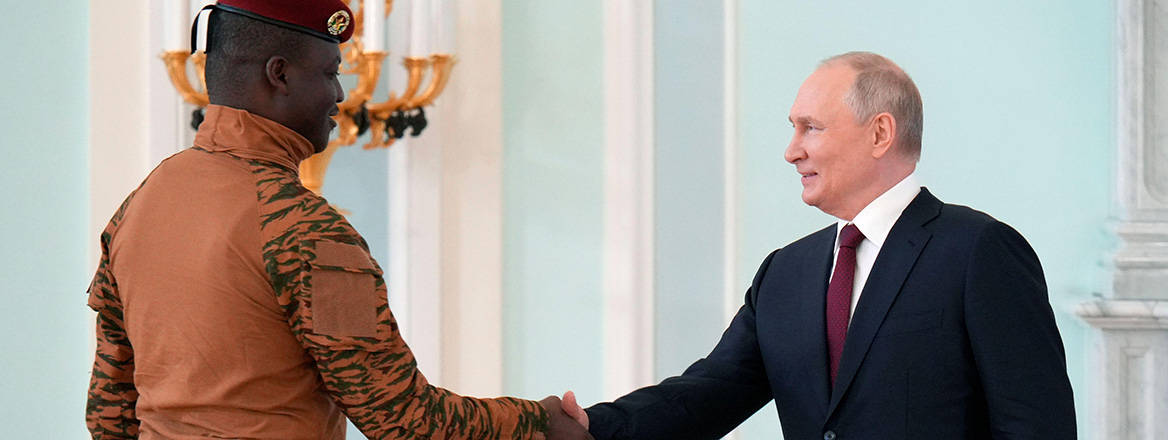Shifting Alliances: The Sahel's Geostrategic Evolution in a Multipolar Era
The recent closure of the last US military base in Niger highlights a shifting geopolitical landscape in which Sahelian countries are diversifying their partnerships beyond traditional Western allies, focusing on strategic deals with new global players.
The US closed its last military base in Niger, located in Agadez, on 5 August 2024, following the earlier withdrawal of 800 troops from the Niamey base in July. This move came in response to demands from Niger’s military regime which, in March 2024, revoked the military accord with the US, signalling a shift in the country's stance on foreign military presence. On 19 April, the US agreed to withdraw its troops from Niger. At that time, there were around 1,000 US troops in the country, stationed at two military bases, including a drone base near Agadez that is essential to US interests in Africa. Concurrently, while the US was discussing the modalities of its withdrawal, a Russian plane landed in Niamey on 12 April carrying a large amount of military equipment, including a Russian air defence system and 100 Russian soldiers from the Africa Corps, referred to as instructors. While according to local sources some of the instructors have left, the anti-aircraft defence system should enable the country to control its airspace against neighbouring countries.
These two events exemplify, in a concrete way, the re-composition of the geostrategic landscape taking place in the Sahel, where countries such as Russia and China have increased their influence, while countries such as France and the US have seen theirs diminish. This change has been marked by a strategy of partnership diversification, which has characterised Sahelian foreign policy under military governments since 2021. This strategy is based on a principle of national sovereignty that prioritises the renewal of partnerships to seek strategic ‘win-win’ agreements for each sector, without having to rely on one partner for everything. On the other hand, it calls into question previous agreements with traditional partners, as the new military governments now perceive that these partners may not have the best interests of the Sahelians at heart or do not fit in with the government’s strategy. One example was the non-renewal of the UN stabilisation mission in Mali, MINUSMA, in 2023 after the Malian authorities demanded its termination. The Malian transition authorities argue that the mission does not meet their expectations as the context requires ‘a force to fight terrorism, going beyond the doctrine of the United Nations peace mission’. A second example of this can be seen with the US withdrawal from Niger, where a spokesperson for the Niger military authorities, the Conseil national pour la sauvegarde de la patrie, said: ‘Niger regrets the intention of the American delegation to deny the sovereign Nigerien people the right to choose their partners and types of partnerships capable of truly helping them fight against terrorism’.
A strategy of partnership diversification has characterised Sahelian foreign policy under military governments since 2021
Since then, there have been many examples of the exiting of various Western missions from the region. This started with the withdrawal of French forces under Operation Barkhane from Mali in 2022) and from Burkina Faso (Operation Sabre) and Niger in 2023, as well as the European missions EUMPM and EUCAP Sahel Niger in December 2023, and now includes the departure of the US from Niger. Nevertheless, it is important to highlight that most Western international actors have not withdrawn from the Sahel, and most of the aid and humanitarian assistance programmes in the region are still led by European and North American countries. The deterioration of relations with the West, especially since the coup d'état in Niger, has also been used as an excuse for Sahelian countries’ political and security approaches at the regional level. In January 2024, Mali, Niger and Burkina Faso decided to suddenly withdraw from ECOWAS. The reason outlined by the junta is that ECOWAS has strayed from its original principles and has fallen under foreign influence (referring indirectly to France).
As relations between the military juntas and the West have deteriorated, other partners have stepped in to strengthen relations with these three Sahel countries. Mali, Niger and Burkina Faso have strengthened their relations with Russia, especially in the security sector, with deployments of Russian and African Corps troops. China and Turkey have also increased their influence in several vital sectors in the Sahel countries. A recent example involving China is the construction of Africa's largest oil pipeline, a 2,000 km long pipeline to export crude oil from the fields of Agadem in southeast Niger to Benin. This pipeline is not only significant from an economic investment standpoint, but it has also become an essential component of diplomatic aid for the Nigerien junta. In mid-April the Nigerien government announced that it had secured a $400 million loan from its Chinese partner as an ‘advance’ for forthcoming crude oil sales, expected to commence in May. This economic capacity will allow the Nigerien government to stabilise its economy after the comprehensive sanctions imposed on it following the coup d'état. Turkey, meanwhile, has become an essential partner for these three countries in the defence sector, facilitating the sale of drones which will be a significant boost to their air capabilities. On 8 April, Burkina Faso received two dozen combat drones delivered by Turkey (Bayraktar TB2 and Bayraktar Akinci), forming a critical component of the country’s counterterrorism strategy.
Western powers are reacting too slowly to the emergence of other partners in the the Sahel, which highlights a shifting global landscape
Finally, the three countries have also increased their presence in the communication sphere of the three Sahelian countries. The Alliance of Sahel States (AES) formed by Mali, Niger and Burkina Faso is set to launch a certified digital platform, featuring an online TV channel, on 16 September 2024, coinciding with the organisation's first anniversary. This initiative follows a key virtual meeting held on 10 July 2024, where the ministers of communication of Mali, Niger and Burkina Faso established the foundation for a unified communication strategy. The ministers prioritised creating an emergency communication plan to inform citizens about major AES initiatives and ‘counter orchestrated misinformation campaigns’. Another recent example of control over the media came at the end of April when the Higher Communication Council of Burkina Faso suspended access to the websites of DW, The Guardian, Le Monde, the BBC, VOA and TV5 Monde (among others) until further notice. It has also suspended the broadcasting of programmes from these channels (for those broadcasting in Burkina Faso) for 2 weeks. The reason for the suspension is that these channels have shared a Human Rights Watch report accusing the Burkina Faso armed forces of carrying out executions of civilians. While these media outlets are downsizing, other media outlets such as TRT and Anadolu Ajansı from Turkey, as well as Chinese agencies such as Xinhua and Russia’s RT, are growing their presence significantly, positioning themselves as media outlets with alternatives to traditional sources such as the Agence de Presse Française. In addition, while this analysis has focused on Russia, Turkey and China, many other regional powers have also forged closer ties with the Sahelian juntas, such as the Gulf monarchies, North African countries like Morocco and Egypt, and Iran.
The expanding influence of these three powers in the region, alongside the declining influence of Western states, clearly demonstrates the multipolarity of the current era. It is evident that there are viable alternatives to Western partners, and countries in the central Sahel region are demonstrating a preference for working with them on issues such as counterterrorism. Unlike Western partners, these alternative powers can respond more effectively to the needs of military juntas, operating without the red lines often tied to standards on civilian protection and human rights, as well as the promotion of democratic transitions. Western powers are reacting too slowly to the emergence of other partners in the region, which highlights a shifting global landscape. These evolving dynamics necessitate a reassessment of traditional diplomatic approaches and strategic alliances.
The views expressed in this Commentary are the author’s, and do not represent those of RUSI or any other institution.
Have an idea for a Commentary you’d like to write for us? Send a short pitch to commentaries@rusi.org and we’ll get back to you if it fits into our research interests. Full guidelines for contributors can be found here.
WRITTEN BY
Beatriz de León Cobo
RUSI Associate Fellow, International Security
- Jim McLeanMedia Relations Manager+44 (0)7917 373 069JimMc@rusi.org



